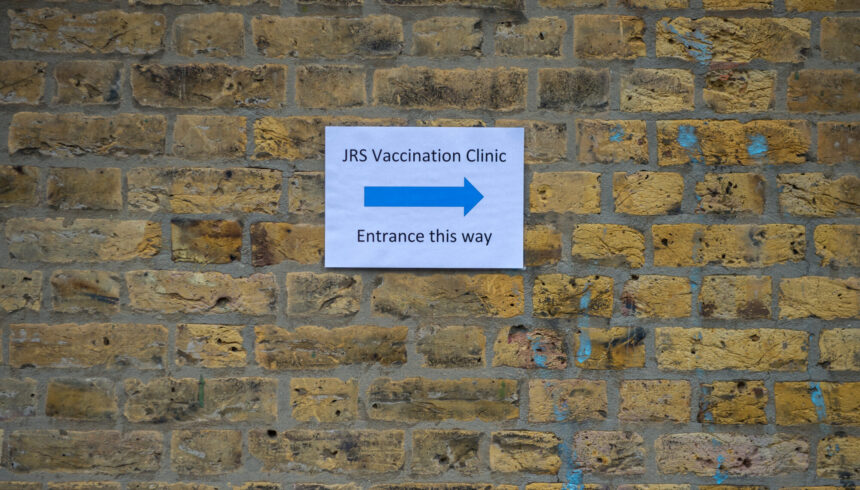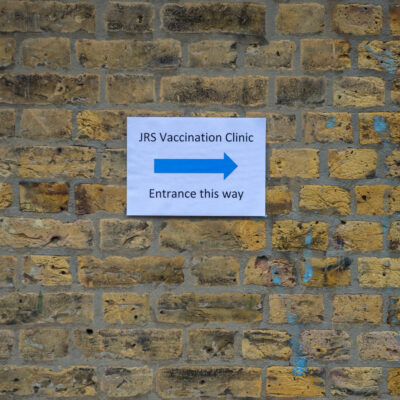“The fact that at JRS we work with vulnerable people, we were lucky that our volunteers and staff were able to access vaccinations at an early stage, but that did not satisfy us, we were worried about our refugee friends as they need to be protected too!”
– Rhiannon Prideaux
This World Immunisation Week, we sat down with JRS’ COVID-19 Emergency Response Co-Ordinator, Rhiannon Prideaux, alongside some refugee friends, who shared with us the story behind the JRS pop-up vaccination clinics launched during COVID-19 lockdown.
First question that pops into my mind: can refugee friends access COVID-19 vaccination centres in the UK?
By law, anyone can access COVID-19 vaccination in the UK regardless of their immigration status. But, in reality, there are several barriers refugees face when they go to vaccination centres. Friends mentioned to us that some centres make it difficult for them to access vaccinations and sometimes they get turned away. Sometimes because of not being registered with a GP, or not having ID. Other times because of not speaking English that well, or not feeling safe enough to go somewhere unfamiliar.
“COVID-19 vaccination at JRS was an amazing initiative. JRS is a place where I feel safe to go to. I wouldn’t have taken my vaccination anywhere else. There was a hostile environment toward refugees in hospitals during Covid. Friends were afraid to get Covid and then having to deal with the hospital authorities, as we know refugees will get neglected because of their status. If it weren’t for JRS, we wouldn’t have had our vaccination because we do not feel safe to have it anywhere else. JRS also gave us a free meal and it was very helpful for me. I had a fever after my vaccination, so I did not have to worry about cooking something while feeling unwell.”
-AJ, JRS refugee friend
Why a vaccination clinic at JRS?
The fact that at JRS we work with vulnerable people, we were lucky that our volunteers and staff were able to access vaccinations at an early stage but that did not satisfy us, we were worried about our refugee friends as they need to be protected too!
During that time, we also heard from our refugee friends about the barriers that they were facing to access covid vaccinations, and we wanted to tackle these barriers by making it easier for our refugee friends to access the vaccine.
We thought it would be better to run clinics at JRS as we could remove as many barriers as possible form the beginning: people knew the team and knew the centre, and we were able to answer any questions and listen to their concerns.
We were able to build-in wrap-around holistic support into the vaccine clinics from the beginning – as refugee friends would be coming to JRS for the first time in months, we wanted to give the opportunity to meet with our casework team face-to-face and to access legal advice too; we covered travel costs for refugee friends to get to the JRS centre (one of the biggest barriers for people needing support is often travel costs); and we knew we wanted to provide a hot meal and to browse food and toiletries from the JRS shop.
“I liked coming to JRS to have my vaccine. People are very friendly at JRS, it feels like home. I wouldn’t have gone to a vaccination centre to have my vaccine. I don’t feel safe going there, I even had issues with my GP.”
-JRS female refugee friend.
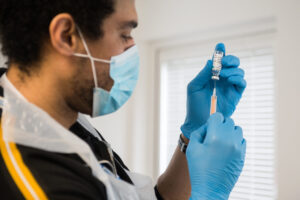
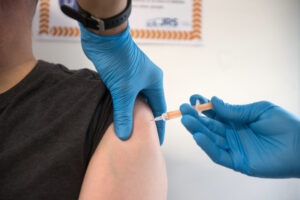
When did it all start?
The first JRS vaccination clinic started on the 11th of March 2021. In total, we hosted 12 clinics across 10 months. We provided our refugee friends with the first and second dose, and in December/January 2022, we provided them with the booster. We were able to provide vaccination for about 90 refugee friends in total.
“The Vaccination was fantastic, JRS called me very quickly, I had a high risk because of diabetes, so they helped me feel safer by providing me with the vaccination, they were super kind and they gave us warm food.”
-Omer, JRS Refugee friend
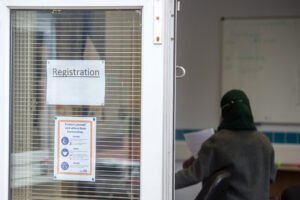
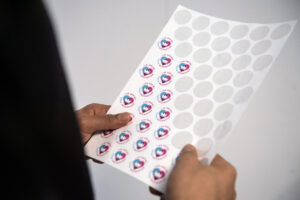
Did you face any challenges?
Tackling vaccine hesitancy, and the swathes of misinformation about COVID-19, was the biggest challenge, and also why we knew that JRS had a unique place to act. Some refugee friends were hesitant about taking the vaccine. Mainly because they were hearing negative news about it, especially AstraZeneca. We tried to tackle that fear by facilitating Zoom Q&A workshops with healthcare professionals to answer any of our refugee friend’s concerns. We ran multiple sessions over 5 months – before we began the clinics, and once the clinics had begun. The Q&As were in 4 different languages: French, English, Tigrinya, and Amharic.
We set-up a WhatsApp broadcast group for refugee friends to share unbiased and well-referenced information about the vaccine, about COVID, and about people’s experiences. We tried to provide refugee friends with the information they needed to make an informed choice for themselves. We also shared videos of volunteers, staff and refugee friends and their positive experiences receiving the vaccine; and we invited refugee friends to share their experience with other family members and friends, so that others are encouraged to take the vaccine too.
“My vaccination experience was very good at JRS. I did not get any side effects for the first two vaccinations. I only got a couple side effects for the booster. I got Covid and it was hard. When JRS called me to offer Covid vaccinations, I was so happy because I did not want to get too sick again. They also provided me with transport money for that, which was so helpful!”
-Our refugee friend, Brigido
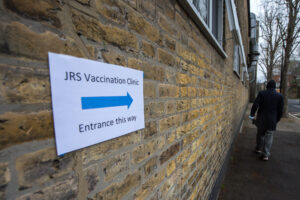
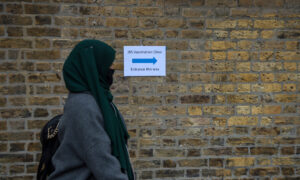
Did we get help from anyone else?
Yes! Barts NHS Health Trust were a key partner for this work – they really took on board the need to reach-out into marginalised communities, and the importance of partnering with grass-roots organisations to share public health messaging widely. The outreach team from Barts and the Excel came to JRS armed with all the vaccinations and vaccinators too.
Initially, the clinic was primarily supported by the JRS staff team, but then JRS volunteers stepped in too to support too. We’re enormously grateful to Tower Hamlets Council, who supported the initiative with key funding support.
Anything else that you would like to add?
We shared our learnings from the vaccine clinics with others, including our friends at St Barnabas Church in Walthamstow. Members of the Filipino community from the church were struggling to access vaccinations. An initial group received vaccinations through JRS clinic, and they went on to set-up their own pop-up clinic with similar support in place. It was really great to see this support in place for as many people as possible.
Any plans to do something similar in the future?
We are not thinking of hosting more clinics in the immediate future as many of our refugee friends are now fully vaccinated. However, we are exploring other health interventions for our refugee friends, such as flu jabs over winter. And we stand ready to respond further to changes in the pandemic.
Images description:
JRS vaccination clinic, London
Credit:
Marcin
If Rhiannon has sparked your interest in the work of the vaccine clinics, you can learn more about the way in which access to healthcare changes for refugees and asylum seekers during the peak of the pandemic in our online event. Access the Healthcare event here

